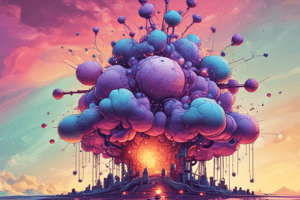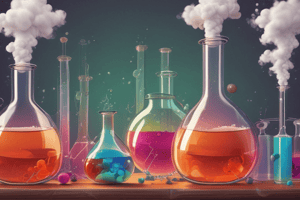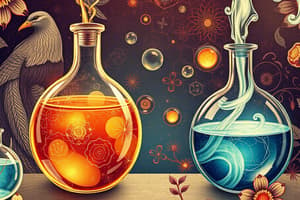Podcast
Questions and Answers
What happens when more reactants are used in a chemical reaction?
What happens when more reactants are used in a chemical reaction?
- The same amount of products is produced
- The reaction slows down
- No reaction occurs
- More products are produced (correct)
What can be inferred about the reactivity of calcium and hydrogen in the reaction Ca + 2HCl → CaCl2 + H2?
What can be inferred about the reactivity of calcium and hydrogen in the reaction Ca + 2HCl → CaCl2 + H2?
- The reactivity of calcium and hydrogen is the same
- Calcium is more reactive than hydrogen (correct)
- Hydrogen is more reactive than calcium
- The reaction is unaffected by the reactivity of calcium and hydrogen
Which of the following is NOT a key concept of the collision theory?
Which of the following is NOT a key concept of the collision theory?
- Nature of the reactants
- Humidity (correct)
- Concentration
- Temperature
What is the effect of increasing temperature on the rate of a chemical reaction?
What is the effect of increasing temperature on the rate of a chemical reaction?
Which of the following statements explains why reaction rates generally increase with an increase in temperature?
Which of the following statements explains why reaction rates generally increase with an increase in temperature?
In the reaction Ca + 2HCl → CaCl2 + H2, what type of reaction occurs?
In the reaction Ca + 2HCl → CaCl2 + H2, what type of reaction occurs?
What is the relationship between the amount of reactants used in a chemical reaction and the amount of products produced?
What is the relationship between the amount of reactants used in a chemical reaction and the amount of products produced?
What can be inferred about the reaction between calcium and hydrochloric acid based on the equation Ca + 2HCl → CaCl2 + H2?
What can be inferred about the reaction between calcium and hydrochloric acid based on the equation Ca + 2HCl → CaCl2 + H2?
What is the effect of temperature on the frequency of molecular collisions in a chemical reaction?
What is the effect of temperature on the frequency of molecular collisions in a chemical reaction?
Why does an increase in temperature result in a decrease in the activation energy required for a chemical reaction?
Why does an increase in temperature result in a decrease in the activation energy required for a chemical reaction?
What is the effect of an increase in temperature on the fraction of high-energy molecules in a chemical reaction?
What is the effect of an increase in temperature on the fraction of high-energy molecules in a chemical reaction?
What is the relationship between the concentration of reactants and the rate of a chemical reaction?
What is the relationship between the concentration of reactants and the rate of a chemical reaction?




